- Home
- Lydia Kang
Toxic Page 18
Toxic Read online
Page 18
“I’m afraid the kimchi is too spicy for you,” Hana says, pointing with her chopsticks.
“I’m afraid the food is going to run out too soon,” Portia says. She’s on her third bowl of soup and fourth bowl of rice already.
“I’m afraid of dying,” Gammand says with a chuckle.
We all freeze.
Gammand doesn’t chuckle about anything, and of all of us, he always seemed the one least worried about death. I’ve seen the fear in everyone else. When people think no one is looking, you can see it weigh down on them. A deep, pervasive sadness. No one on the ship seemed at peace with leaving this world, except Gammand, who was the same stolid, unshakable Gammand all the time. Everyone sighs in secret, except for Gammand.
So we all stare at him, spoons and chopsticks hovering above bowls, halfway to our mouths.
“I mean, who isn’t afraid?”
“I’m not afraid,” Portia says. She reaches with a spoon to scoop more of the bean sprout salad.
“Come on. Tell me there aren’t things you wish you could still do. Could have done.” Gammand leans back, slouching.
“I have regrets,” Portia says. “The same as everyone here. But no, I’m not afraid to die.” She isn’t clasping her hands together, but I’ve seen her do it enough that I doubt her words. “My brother will get all my credits. He will have a better life because of me.”
“Maybe it should have been you who had the better life,” Gammand says.
“I’ve made my choices. They are mine. I don’t need you to tell me what I should or shouldn’t have done.”
Hana glances at me, and then at Portia. “What’s your brother like?” she asks.
Everyone stares at her. It’s been an unspoken thing, since we all signed on, to not discuss our reasons for why we’re here, or even who benefits from our death. For nine months on that ship, none of us asked that question. Hana crossed a line.
“Hana,” I say, leaning close to her, “I don’t think we should talk about that.”
“Why not?” she says. “If I don’t do something to help Cyclo, we will all die. But I know…” She blinks a few times, as if her eyes sting. “I know that I will probably die on this ship like my mother, and that in the end, you will be the only people who ever really knew me. So I should like to know you, too. Even if our memories are blitzed into oblivion, I should still like to know.”
“Excellent idea!” Gammand says, and he gags for a second. God, I hope he doesn’t puke all over the table. I take the opportunity to surreptitiously swipe his flask of booze and hide it under the table.
Portia mouths at me, Thank you.
“I’ll start,” Gammand says. “I’m twenty-nine years old. I’m a data packager, by trade, and worked for a mining facility. And I have no family. Everyone died on Crix while I was working remotely.” He’s silent for a minute. Portia looks at me. A knowing look.
And then I put it together. “Gammand, are you…related to the Shrytax family? From Crix?”
He nods.
I get it. His family didn’t just die on that planet. There was some political battle over a mining contract, and an arsonist blew up a space station, hoping to make the argument completely moot. But the explosion was far larger than expected. It didn’t just destroy the station. The station ended up crashing to the planet and catastrophically altered its atmosphere. Gammand helped commit accidental genocide on his own people.
“You were the arsonist?”
“Yes, I was. A damn good one, too. Too good, apparently.” His eyes have a hollow look as he stares at the blue walls. “I’ve been helping some of my people get settled, now that they have no home. But you know how it is with interstellar goodwill missions. They only help if there’s something in it for them, and Crix never signed the 90XR treaty, so it doesn’t qualify for aid. What I earn on this mission helps about a hundred people get a new home.”
Gammand paces around us as if we’re playing some weird game of duck-duck-goose. “I have been in prison for ten years. Ten years, since I was nineteen years old, in solitary, on the surface of Jupiter, inside that red hellhole of an eye, where all I had to stare at were white walls that flashed photos of my entire family. I killed them all.” He wildly flings his arms around while he circles us.
“So I had my chance to give up my life, because it was over anyway. I was going to be executed this week, in fact. It’s all very symbolic, isn’t it? But in my death, I pay for a few people’s freedom to start a new life somewhere else, where my murderous stink won’t haunt them, and where they won’t be worked to the bone anymore. So, you see,” Gammand says, stopping right behind Hana. “I don’t care about getting to know you. I only care about getting this godawful job done. And if you try to save this ship and ruin my chances, then my own death is really worth nothing. And I won’t have that.”
Chapter Nineteen
HANA
Gammand walks unsteadily to the door, where Cyclo quickly opens the membrane.
“Thank you for the meal. It was”—he burps loudly—“delicious.”
The door pinches shut behind him.
“I guess he really likes our cooking,” I say, eyebrows raised.
Fenn rolls his eyes at the door. “Hana. He’s drunk off his ass.”
I ponder this a moment, what it means to be off one’s ass. Does it mean he fell off a chair? Does it mean his buttocks fell off? Because they didn’t. I really should have studied the idiom dictionary Mother found for me. Too late now.
“Wow. Even on my home world, that was rude,” Portia says.
“Oh. I’m sorry I asked,” I say. “I shouldn’t have said that.” Like everyone else, I’ve stopped eating.
“No, don’t be sorry.” Portia reaches over a ridiculously long arm and pats my hand. Her red eyes find mine. “It’s such a human thing to do, what you did. More human, even. So many people tread so delicately around emotions, it’s like they’re afraid they even exist. It makes for terribly bland conversation. But that pure emotion? It’s one of the reasons why I don’t completely loathe Homo sapiens.”
“Homo sapiens novum,” I say, smiling.
Portia pulls her hand back and returns to nibbling on the spinach salad. “My brother has both Prinniad and human parents. He doesn’t live on Prinnia with our family. His father took him to Forxis, and he now has two little ones himself. But life there is so hard. They’ve all gotten blood infections, repeatedly, and it nearly killed my niece. Their immune systems aren’t doing well there. My gift to them is the money it will take to buy full Prinniad citizenship. Then they can go back home. No more infections. No more suffering.”
“No one can buy that. The elimination of suffering,” Fenn says. His face has gone cloudy with thoughts.
“But that must be very expensive,” I say. I don’t quite understand the concept of what costs what, but I’m beginning to understand that what the Selkirk crew’s families are receiving in exchange for their lives is an enormous amount of money. Enough to change many lives in a substantial way. I read that Prinniads take almost no new inhabitants from other planets. They make it prohibitively difficult. And expensive.
“I’ve had a good life,” Portia says. “A good ten revolutions around our star. That’s about twenty-two Earth years. I’ve fallen in love, I’ve learned many things. And it’s time for me to share. In my death will bloom opportunity for a whole family. I cannot be sad.” She smiles. For the first time, her toothless smile doesn’t look strange to me at all. Happiness has a common thread in all of us, and that beauty has so much clarity right now.
“Weren’t you in the penitentiary where Gammand was?” Fenn asks.
Portia laughs. “I didn’t say I haven’t made my share of mistakes!” She leans in close to Hana. “You’re looking at the person responsible for launching the parasites on Sentress. It destroyed a whole crop of crikio blooms and made th
e competing company very rich. They paid me well, but I got caught.”
Somewhere, far away, there is a faint thump and a yell. Portia rolls her scarlet eyes. Fenn looks at his holofeed and shakes his head. “Gammand is completely wasted. Someone needs to get him into a safe quarter to sleep it off. We don’t have alcohol reversal agents on board. And we should watch him. You know.”
Just in case, is what Fenn wanted to say. In case someone tries to hurt him, like they hurt Miki.
“I’ll get him,” Portia says. “In fact, we should all go to sleep.” She looks half asleep already from eating all that rice. As I recall, Prinniads don’t process carbohydrates well—they ferment in their digestive systems, so Portia is probably a bit affected as well.
Everyone stands to leave. Fenn, too, wipes his hands and prepares to leave.
“Shouldn’t we clean up?” I say.
“What’s the point?”
Hmm. True. But the truth is, I want to hold back from making this night end. It might be the last time I have anything this close to normal, and normal is so new to me. I’m loath to let it out of my grasp. What’s worse is that simmering close, terrifyingly close, is the anguish of knowing that I have no family in this world, and that my world is shortly going to implode. It’s a terrible reality I cannot undo, I can’t unravel and restart, I can’t scrub away. And anything that helps me forget is worth clinging to.
Fenn is standing by the doorway, watching Portia catch up to Gammand. He looks at them almost longingly. Inside the room, it’s so quiet.
“It’s too quiet,” Fenn says, as if he can read my mind. His eyes are still on the empty hallway, as if it holds so much more promise than I do.
What he doesn’t say, and I am thinking: we’re alone.
What I don’t want to admit: I’m so very lonely.
I say nothing, feeling the yawning emptiness, despite Fenn being close by. But he seems elsewhere already, departed with his crew down the hallway, thinking a memory I don’t share with him.
“We should go to sleep,” I say. This is the one good thing about not being trusted by the crew. Fenn stays with me always, like a shadow, and I find it a relief. After seventeen years of being alone in my room, I am not at all willing to go back to solitude. It’s a dirty word now.
He turns toward the room. “I guess so. God, it’s so quiet. I hate the quiet sometimes.”
“I could ask Cyclo to put on a newsreel. Or an old movie.”
“How about some music?”
“Okay,” I say. But the array of music available on Cyclo’s archives is dizzying. “I never know what to listen to. Mother has me listen to music from the eighteenth and nineteenth Earth centuries.”
“I like the late twentieth-century stuff. Cyclo, play some Big Star.”
Cyclo finds the music immediately. It’s very simple, just guitar, vocals, and a distant drum set. It is pleasant. I like it better than instrumental-only music—the violins always sound like they’re crying.
I ask Cyclo to make some bed-like forms out of her matrix, and she complies. She puts them very far apart, almost against the opposite long walls, which makes me pout a little. I like to sleep when Fenn is closer. Fenn looks at the bed and shakes his head.
“You sure it’s safe? We shouldn’t touch Cyclo…”
“We can put some clothing down so you don’t touch her directly,” I say. But Fenn shakes his head again.
“I can’t sleep yet, anyway. I keep thinking of Miki.”
“Yes. And Miki reminds me of other things.” As in, the end of everything. Of creatures in my life lost, without my permission, while my mind is in the bitter forgetfulness of sleep. But I don’t want to say it out loud, and apparently, neither does Fenn. “Maybe you should do something else,” I say. “Maybe wind your watch.”
He turns to me, his eyes seeing me as if I’d been gone a week. “My watch. Oh.” He glances at the timepiece on his wrist. “It needs a good cleaning, actually. I don’t have the tools for it.”
As if later, he could. As if he’s going to outlive Cyclo and me and this entire decaying mess that is our circumstance right now.
“Why do you like watches? They’re so imperfect.” I peer closer, and he holds it gingerly out toward me, not quite ready to hand it over for a closer look.
Fenn smiles. “Because once upon a time, this was all they had to know how much time passed. Not just the sun passing overhead, or the moon rising, to pass the day. They needed to know precisely how quickly or slowly things happened. They wanted to measure it. I mean, can you imagine what you would do if you had nothing but metal and tools and the raw ingredients to craft something that could do so much, be so beautiful?”
“I do.” I go to the lacquer box by the wall, where Cyclo moved it to make room for our dinner party. From inside, I pull out a set of wooden knitting needles. Nestled nearby is a square of knitted wool, about one foot by one foot. It’s a beautiful piece of work, knit with cables and seed stitches in a lovely pattern that looks like ripples of water. The wool is soft and pale green. Below are several keepsakes belonging to generations of the Um family, but I don’t unearth those.
“You made this?” He touches the different stitches, pressing his fingertips here and there to explore the texture.
I nod.
“What is this made of?”
“Wool. It’s the hair that comes off an Earth sheep, a kind of animal.”
“How the hell did you get wool way out here? And these?” He picks up the knitting needles and examines them, too. The oil and constant use by my hands have burnished them with a silken smoothness. They are the color of ripe Nebraska wheat fields. Or so a picture once told me.
“Where did you get these?”
“They belonged to my great, great, grandmother. The wool came from a small garment that she knit. But when I wanted to learn how, I ended up unraveling the sweater. Isn’t it funny that it’s called a sweater? It’s supposed to keep you warm, so you sweat, maybe? It’s such a funny word. But in England, they called it a jumper, but it doesn’t make you jump—”
Here, Cyclo flashes a gentle lavender to tell me I’m running my mouth again.
“Anyway,” I say, “I unraveled it back into yarn. But that wasn’t enough. I wanted really to know exactly how to do it from the beginning. So I brushed and picked at all of it until it wasn’t yarn anymore, just a mass of fiber. And then I hand-spun it back into yarn. And Cyclo helped me extract some cobalt, and I dyed it blue. And I looked up some books in the archives, and I knit my first tiny blanket.”
Fenn looks over the square of fabric and raises his eyebrow. “How many times did you…undo this and repeat the process?”
“A lot.” I’m embarrassed by the number. A hundred and three, to be exact. A hundred and three times I dyed the wool, I spun the wool, I knit the wool, I made tiny, infant-size cardigans, and booties, and little blankets, and tiny satchels. Things that I could never use, never did use, but made for the sheer joy of making something. From scratch, is what they used to call it. Though, what scratching has to do with anything, I don’t know.
“Do you know,” Fenn says quietly, “how many times I took this watch apart and put it back together?” He steps closer to me, still holding the timepiece in one hand, still holding my little blanket in the other.
“A lot?” I whisper.
“Yes. Funny how, with everything available to us, we still want to learn how to do things the old ways.”
I shrug and smile. “This is what antiquists do.”
“Yeah. A funny word for people who find joy in the beauty of the old ways. Like singing. And dancing.”
“I don’t know how to dance,” I say. For some reason, my cheeks are hot. I’d ask Cyclo to measure my temperature to see if I have a fever, but I’m too embarrassed to ask.
“I do. I can show you. Any good antiquist needs to kn
ow,” he says, winking. A new song comes on. “I like this one. It’s called ‘The Ballad of El Goodo.’” A guitar begins, with a melody and chords that sound like starshine.
“I see why they’re called ‘Big Star.’”
“I’ve no idea why they’re called that. I just like the music,” Fenn says. The music is everywhere, and it’s so sad, and so hopeful, and so aching. Before I can even think, Fenn has moved even closer and captured my waist in his left arm and clasped my right hand in his.
“I’m not going to fall,” I say.
“This is dancing,” Fenn tells me. “Don’t you know what dancing is?”
“Yes. No. I’ve seen it on the vids…” My face goes hot again. “This is very strange. Usually I’ve watched people dancing alone.”
“Put your other hand here,” he says, and settles my left hand on his right shoulder.
“Is this right?” I whisper.
“Pretty much, yeah.”
We sway for a while, the music everywhere, Fenn’s scent everywhere. It reminds me of the time Cyclo tried to synthesize Earth scents to keep me entertained. She manufactured the saltiness of a Caribbean beach, a mountain just after a blizzard, and a Pacific Northwest forest in spring. It is the last one of these that Fenn smells of, of green things wanting so desperately to live. How fitting.
I put my cheek on his chest. “Can I rest my head here?”
“Yes,” he says, but his voice sounds oddly strained. He leans his own cheek against the top of my head because he’s so very tall, and we continue to sway. For this lightning-quick second of my life, there is nothing but Fenn, nothing but warmth and primeval forests and his hands keeping me from spinning into my frantic thoughts. So it’s utterly illogical that I find the need to ask him a question.
“Fenn? Why were you the only person who didn’t say why you’re here on this mission?”

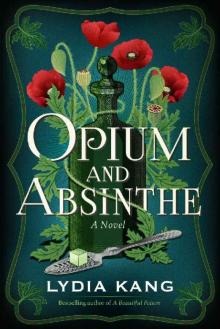 Opium and Absinthe: A Novel
Opium and Absinthe: A Novel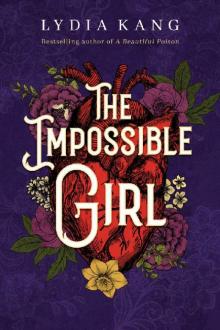 The Impossible Girl
The Impossible Girl Toxic
Toxic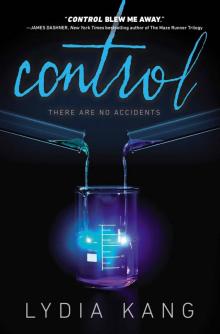 control
control Catalyst
Catalyst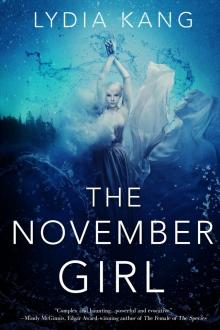 The November Girl
The November Girl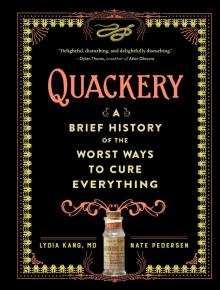 Quackery
Quackery